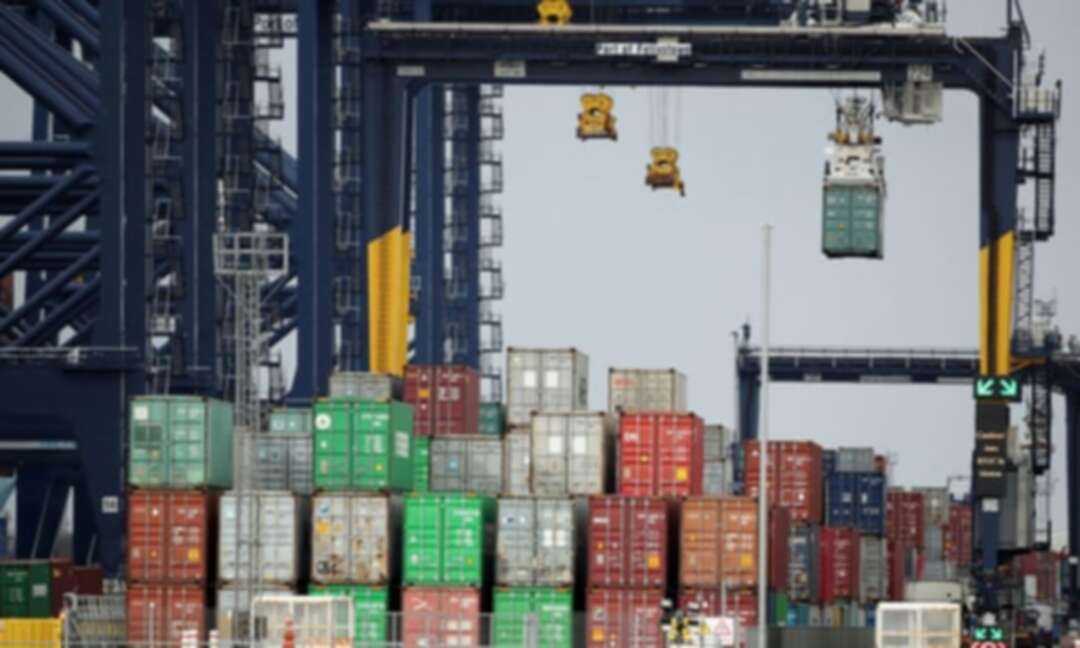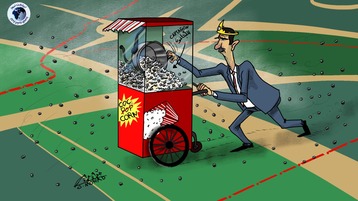-
Exports to EU plunge by £5.6bn in first month since Brexit

Fall of 40.7% comes as UK economy in January shrinks by most since first wave of Covid pandemic
UK exports of goods to the EU plunged by 40.7% in January during the first month since Brexit and the toughest Covid lockdown since the first wave of the pandemic, contributing to the biggest monthly decline in British trade for more than 20 years.
In the first month since leaving the EU on terms agreed by Boris Johnson’s government, the Office for National Statistics said goods exports to the bloc fell by £5.6bn, while imports fell by 28.8%, or £6.6bn.
Exports of food and live animals to the EU, which includes seafood and fish, were the hardest hit by Brexit, collapsing by 63.6% in January.
This reflected heavier disruption and additional checks for consignments from this sector that prompted furious protests from the fishing industry. However, food and live animals account for only 7% of total UK exports.
After stockpiling and disruption at UK borders in the run-up to the Brexit transition, the decline also came as the economy shrank the most in January since the first wave of the pandemic, with gross domestic product (GDP) falling 2.9% from the level in December.
The ONS said the January performance was the worst since monthly records began in 1997, as a 1.7% rise in non-EU trade, worth £200m, failed to make up for the plunge in cross-border activity with the UK’s biggest trading partner. Overall, global UK exports and imports fell by about a fifth.
Although January’s GDP figure represents the biggest contraction since the first lockdown almost a year ago, analysts had forecast a bigger decline of 4.9%, suggesting that businesses and households adapted better to harsh restrictions than during the first wave of the pandemic, when GDP fell by more than 20% in April 2020.
Experts said the scale of the decline in January trade was unlikely to be permanent because there was evidence companies stockpiled goods before the Brexit deadline, meaning they would not need to send as many shipments as usual in January. The decline was lower than a 68% plunge anticipated by road hauliers, while the ONS said there were signs trade had started to pick up at the end of the month.
The closure of shops during the Covid-19 lockdown reduced demand for clothing shipments, while car production fell and exports were weak to EU countries with coronavirus restrictions.
Alongside stockpiling, Covid disruption and lockdown, the ONS also changed the way it collects export data after Brexit, which could mean it takes longer to record some UK goods shipped to the EU. However, economists said Brexit still had a telling impact in January despite difficulty disentangling multiple pressures on the economy.“Brexit made a bad situation worse in January,” said Samuel Tombs, the chief UK economist at the consultancy Pantheon Macroeconomics. “Our view remains that Brexit is best seen as a slow puncture, rather than a sudden blowout, with the costs gradually accumulating in the form of lower investment and immigration than otherwise would have been the case.”
Although the government has admitted that “teething problems” at the start of the new relationship have affected cross-border trade, business leaders are warning that lengthier delivery times and higher costs are likely to remain as an endemic feature of Brexit.
Suren Thiru, the head of economics at the British Chambers of Commerce, said: “The practical difficulties faced by businesses on the ground go well beyond just teething problems and with disruption to UK-EU trade flows persisting, trade is likely to be a drag on UK economic growth in the first quarter of 2021.”
The government on Thursday was forced to delay the introduction of further post-Brexit import checks by six months – a U-turn because a network of 30 border posts being built to process incoming goods would not have been ready on time.
A government spokesman said a “unique combination of factors” including Covid lockdowns across Europe, stockpiling last year and business adjusting to the new trade relationship made it inevitable that exports to the EU would fall in January.
“This data does not reflect the overall EU–UK trading relationship post Brexit and, thanks to the hard work of hauliers and traders, overall freight volumes between the UK and the EU have been back to their normal levels since the start of February,” he said.
“Many businesses have adapted well, and our focus now is on making sure that any business that is still facing challenges gets the support they need to trade effectively with the EU.”
source: Richard Partington
Levant
You May Also Like
Popular Posts
Caricature
BENEFIT Sponsors BuildHer...
- April 23, 2025
BENEFIT, the Kingdom’s innovator and leading company in Fintech and electronic financial transactions service, has sponsored the BuildHer CityHack 2025 Hackathon, a two-day event spearheaded by the College of Engineering and Technology at the Royal University for Women (RUW).
Aimed at secondary school students, the event brought together a distinguished group of academic professionals and technology experts to mentor and inspire young participants.
More than 100 high school students from across the Kingdom of Bahrain took part in the hackathon, which featured an intensive programme of training workshops and hands-on sessions. These activities were tailored to enhance participants’ critical thinking, collaborative problem-solving, and team-building capabilities, while also encouraging the development of practical and sustainable solutions to contemporary challenges using modern technological tools.
BENEFIT’s Chief Executive Mr. Abdulwahed AlJanahi, commented: “Our support for this educational hackathon reflects our long-term strategic vision to nurture the talents of emerging national youth and empower the next generation of accomplished female leaders in technology. By fostering creativity and innovation, we aim to contribute meaningfully to Bahrain’s comprehensive development goals and align with the aspirations outlined in the Kingdom’s Vision 2030—an ambition in which BENEFIT plays a central role.”
Professor Riyadh Yousif Hamzah, President of the Royal University for Women, commented: “This initiative reflects our commitment to advancing women in STEM fields. We're cultivating a generation of creative, solution-driven female leaders who will drive national development. Our partnership with BENEFIT exemplifies the powerful synergy between academia and private sector in supporting educational innovation.”
Hanan Abdulla Hasan, Senior Manager, PR & Communication at BENEFIT, said: “We are honoured to collaborate with RUW in supporting this remarkable technology-focused event. It highlights our commitment to social responsibility, and our ongoing efforts to enhance the digital and innovation capabilities of young Bahraini women and foster their ability to harness technological tools in the service of a smarter, more sustainable future.”
For his part, Dr. Humam ElAgha, Acting Dean of the College of Engineering and Technology at the University, said: “BuildHer CityHack 2025 embodies our hands-on approach to education. By tackling real-world problems through creative thinking and sustainable solutions, we're preparing women to thrive in the knowledge economy – a cornerstone of the University's vision.”
opinion
Report
ads
Newsletter
Subscribe to our mailing list to get the new updates!






















